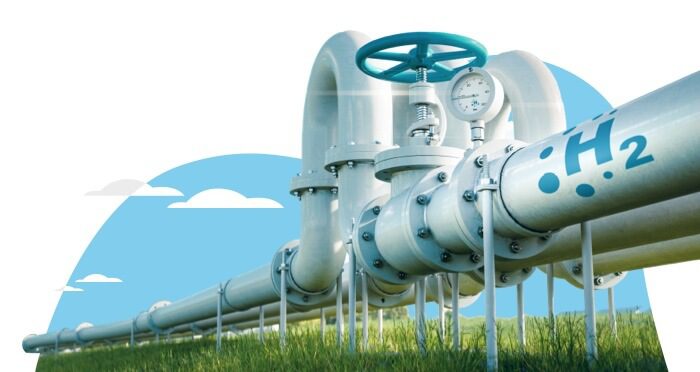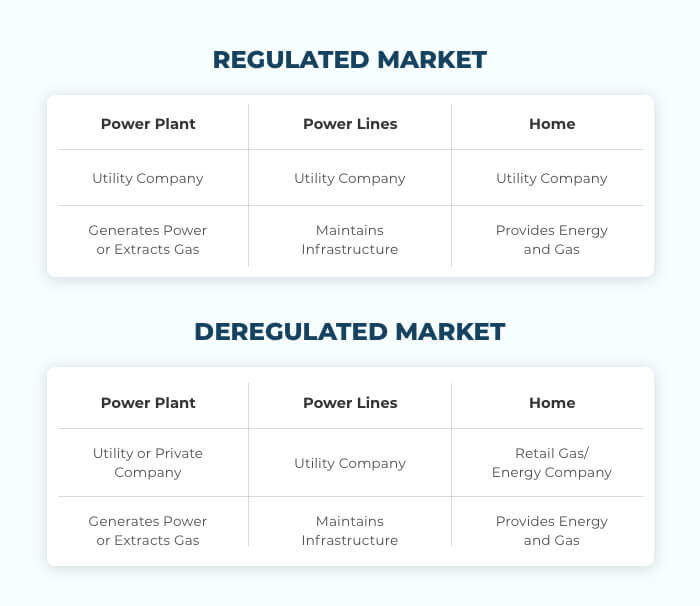Gas and Energy Suppliers vs. Utilities: Explained
by Greg Rabaey
7 min read

The Difference Between Energy Providers and Utilities
Do you know who provides your gas and electricity? Here’s a better question — do you know if you have a choice of your energy or gas supplier?
You might think of your “utility” and “provider” or “supplier” as being one and the same. But in states with deregulated electricity and natural gas markets, you may have some important choices to make that could save you money.
In states with a deregulated gas or energy market, public utilities are separate from retail gas and/or energy providers. If you’re in one of those states then you get to choose your provider — which has a big impact on the quality of your service, the type of gas or electricity you have access to, and the payment plans you can select.
Key Points of This Article:
- Deregulated markets allow third‑party energy suppliers to compete with utilities, giving consumers more choice in pricing and plans.
- Utilities continue to manage and maintain the infrastructure that delivers electricity and natural gas to homes and businesses.
- Energy suppliers purchase gas or electricity at wholesale rates and offer various plans, customer service options, and contract structures.
- You should contact your utility for delivery issues or emergencies, and your energy provider for billing questions, plan changes, or service transfers.
Here’s everything you need to know about energy providers and how they differ from utilities — and how you can benefit from those differences.
What is a deregulated energy market?
How is energy and gas delivered?
What is a retail energy or gas provider?
What is the difference between utilities and providers?
When should you call the utility company?
When to call the retail energy or gas provider?
Who is Santanna Energy Services?
What is a deregulated energy or gas market?
In deregulated energy and gas markets, the central control of a utility company is broken up in favor of third-party energy service companies (ESCOs) that compete against other ESCOs — also sometimes called alternative energy suppliers (AES). ESCOs purchase gas from a refinery or electricity from a power plant at wholesale prices and then sell those energy sources to consumers.
Note that a deregulated market doesn’t mean there aren’t any regulations on how gas or energy is generated, processed and sold. There are still important codes, restrictions, and regulations that determine who can qualify as an ESCO, the quality of their services, and the options they can provide.
In regulated markets, the government — or some other singular organization such as an industry or labor group — has complete control over a product or service. In a regulated energy or gas market, the government will control the production and distribution of gas and/or electricity through a public utility.
Different states started to deregulate the gas market in the 1970s, while the deregulation of electricity markets began in the early 1990s. As of today, half of all states, plus Washington D.C., offer some form of deregulated electricity and natural gas.
How is energy and gas delivered?
In both regulated and deregulated markets, electricity is created by generators at power plants then sent to substations where it is converted into high-voltage electricity through transformers. That high-voltage electricity is then sent across power lines to businesses and residential properties where it is transformed into lower voltages for safe use.
Natural gas works in a similar way, where it is extracted from the earth in refineries. Gas is extracted from a well and then sent to processing plants where contaminants like water vapor are removed. Natural gas can also be cooled to about -162°C (-260°F) and stored as liquified natural gas. When purchased for use, natural gas is shipped to the home through pipelines.
What is a utility company?
Utility companies facilitate the distribution and transmission of “essential” services, which can include water, electricity, gas, and telecommunications. They’re responsible for maintaining the infrastructure that delivers all of those services. If you’ve seen someone working on power lines or fixing a water main, that’s usually the utility company.
In states that have regulated markets, the utility companies are the sole providers of gas and electricity. This means they own and control the energy and gas from beginning to end. They may even own the refineries where gas is extracted or the power plants where electricity is generated. This is essentially a regulated monopoly where one company controls the entire supply as well as the means of access.
In deregulated gas and electricity markets there are still utility companies, but either they will compete against ESCOs or they will exist only to install, operate, and maintain infrastructure.
What is an energy or gas supplier?
In deregulated states, while the utility company still builds and maintains the infrastructure, it is the retail gas and electricity providers that actually purchase and provide gas and electricity to consumers. Much like retail outlets you would find in other industries, retail energy and gas providers compete against each other by offering different price plans, contract structures, purchase options, and levels of customer service. Being customer facing, they are ones who provide customer service and bill for services.
Because energy and gas providers are competing for customers, they will differentiate from each other in important ways, including offering different price plans. This is because they all source their energy and gas from different plants and refineries, which can affect the base cost of the utility and determine what type of services they can provide.
An energy provider may purchase electricity from nuclear power, coal energy, hydropower, solar power, or wind power power plants. Where an energy provider sources their energy will affect its price and whether it’s considered “green” or carbon neutral.
Natural gas providers don’t have as many alternative options, as all natural gas is mainly methane containing varying proportions of other hydrocarbons, carbon dioxide (CO2), sulfur dioxide, nitrogen, water vapor, and helium. Natural gas refineries may differ in how they extract and process natural gas for consumption, which could affect pricing.
What is the difference between utilities and providers?
If you’re in a regulated market, then the utility company will build and maintain infrastructure as well as provide the supply of gas or electricity. In this case they are the sole provider.
In deregulated markets, it is ESCOs that provide gas and electricity, delivering over the infrastructure maintained by the utility company. They deliver over the infrastructure maintained by the utility company.
When should you call the utility company?
Even in deregulated markets, utilities companies are responsible for the delivery of gas and energy, which means they are responsible if there are any issues with delivery. Contact your local utility if:
- There is service disruption such as a power surge or outage
- There is an issue with your electrical or power meter
- There’s construction on or near your property and you need to locate any lines or pipes
- In the event of any emergency such as a downed power line or gas leak
When should you call the energy or gas provider?
If you’re in a deregulated market, then a retail energy provider handles the delivery of your gas or electricity. You’ll want to contact them if:
- You want to cancel or change your plan
- You want to transfer your service to a new address
- You want to make a payment over the phone*
- You have questions or disputes about billing*
*Note that some utilities are purchase-of-receivables (POR) utilities, where a utility company purchases the receivables (gas or electricity) of a retail supplier. In this case it is the utility that handles all billing inquiries and bill payments. For example, when customers do business with Santanna Energy, they still receive the same quality energy or gas, delivered the same way, with one bill from their utility provider. Customers simply pay for Santanna Energy’s plan instead of what the utility provider offers.
Who is Santanna Energy Services?
For 35 years, Santanna Energy Services has been the energy supplier of choice for thousands of customers in Ohio, Illinois, Pennsylvania, Michigan, and Indiana. As an employee-owned company, we specialize in providing customer-focused natural gas and electricity plans that are tailored to your home energy needs — including fixed rate, unlimited, and earth-friendly energy plans.
Greg Rabaey is the retired CEO of Santanna Energy Services and a respected leader with more than 30 years of experience spanning technology and the energy industry. With a strong academic background in mathematics, computer science, and physics, including a Ph.D. in Physics from the University of Arizona, Greg brought analytical rigor and forward-thinking leadership to every stage of his career.
During his tenure at Santanna Energy Services, Greg played a pivotal role in shaping the company into a consumer-centric energy provider, delivering electricity and natural gas to homes across the Midwest. His strategic vision, commitment to innovation, and dedication to both employees and customers helped drive the company’s growth and expand its earth-friendly and unlimited energy offerings.
Now retired, Greg remains proud of the foundation he helped build and the lasting impact of Santanna’s mission. Outside of his professional achievements, he is known for his strong commitment to community involvement and his belief in driving positive change through leadership, integrity, and service.








